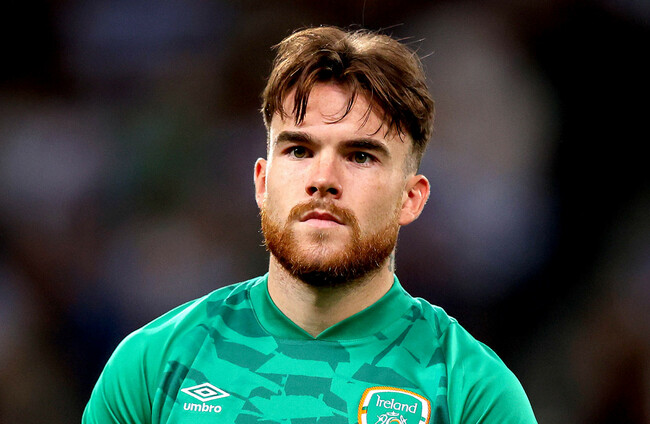REPUBLIC OF IRELAND attacker Aaron Connolly has revealed he is in recovery from alcohol addiction after recognising that his lifestyle was causing serious harm both to himself and to his loved ones.
Connolly, who joined English Championship side Sunderland on a one-year deal in September, spent a month in a treatment clinic over the summer and says he now “couldn’t be any happier” as he attempts to rebuild his life and reignite his football career.
The Galway native, 24, laid bare his years-long dependence on alcohol in an in-house video interview with Sunderland, which Connolly’s new employers published as part of World Mental Health Day.
Connolly, who has nine senior caps for Ireland, admitted that his relationship with alcohol reached the point he would look forward to going drinking while playing football matches.
But the former Brighton winger stressed that while his on-field career trajectory took a downward turn due to his addiction, his personal life ‘took the biggest beating’ as he broke the hearts of his parents and loved ones.
Connolly pinpointed his revelatory two-goal performance for Brighton against Tottenham in 2019 as a turning point for the worse, while also confirming that the English PFA contributed to the cost of his treatment over the summer.
‘It was obvious I had a problem with alcohol. It was killing the people around me and it was killing me.’
— Sunderland AFC (@SunderlandAFC) October 10, 2024
On #WorldMentalHealthDay, Aaron Connolly opens up about the impact of addiction and tells his story in his own words.
“I don’t know how to put this bluntly… it was obvious I had a problem with alcohol for a good few years,” Connolly said.
“I had my parents — who never drank before — always telling me when I was younger and when I’d go out, they’d always advise me to stay away from alcohol. It was always their thing because of addiction to alcohol in my family.
“I didn’t listen, clearly, and it got me in a lot of trouble. It got me a lot of problems and it just became something that I relied on.
“It felt like my buzz used to come from football, winning games and scoring goals, and it got to a point where the buzz was more from drinking alcohol than going out on a football pitch.
I used to look forward to the games finishing so I could have time to go and have a drink, go and socialise. ‘Socialise,’ I say, but it wasn’t. It was an excuse to go and get drunk.
“That was where I got my buzz from, whereas before, it was always the buzz of football and the buzz of being around an environment like I am now and feeling the way I am now: excited to play football,” Connolly added. “Whereas for three or four years, that just wasn’t there.”
Connolly says he came to the realisation in late July that his lifestyle had become untenable.
He credited his manager at Hull City last season, Liam Rosenior, for efforts to help him, but said that his life had become “unmanageable” before he was released by the Tigers in June.
Ultimately, Connolly sought professional help and checked into a treatment facility. He made the decision not to save his football career, he explained, but to ‘get his life back.’
“I decided, I think it was the end of July, that it was too much. I couldn’t do it,” Connolly said.
I couldn’t live the way I was living because it was killing people around me, to be honest with you: my family, my friends, and mainly it was killing me, really.
“I had one of my best seasons last year at Hull but off the pitch, my life was a mess. The manager at Hull, to be fair, always looked after me and always tried to help, but I just got to a point where… it wasn’t like life wasn’t worth living it — it was just my life was so unmanageable and I couldn’t control what I’d do or I couldn’t control my alcohol.
It just got to a point where I had to make a decision that I needed to go to a treatment clinic. I spent a month there in the summer and I just said to my agent, ‘I don’t want you contacting any clubs, I’m not doing this for football, I’m not doing this for anything else. I’m doing this so I can get my life back’.
“If stuff in football comes with that”, Connolly added, “then that’s a bonus. But it wasn’t even the football in the end that was taking the biggest beating. It was my life, my relationships, my family, my friends. Everything was just failing and falling apart.
When your parents are calling you and you’re not answering calls because you know you’re breaking their heart, it’s time to realise that I’ve got a problem.
Connolly said that he had decided to open up about his alcohol addiction in the hope that it would help people in similar situations to come to the same realisation as he did back in July.
He stressed that alcohol dependency is not always conspicuous and can affect anyone, regardless of their personal circumstances.
“I had everything that any young boy would dream of and I couldn’t get hold of my addiction,” Connolly said.
“This isn’t just to help just footballers. I know there’s people out there that could be in the Sunderland area, the Brighton area, the Hull area — I’m just saying them for examples of clubs I’ve played at.
“I was grateful that the PFA helped me out with the cost of the treatment centre. I know some people might not be in that position to be able to afford it, but I just wanted to speak about it [to show people] that it’s not just a park bench and a vodka bottle, that’s not it. Anybody can get affected by it.
“There’s no price tag or there’s no amount of money in the world that can cure it. It’s a disease, it’s an illness and I never thought of it like that until I decided that I needed to go to the clinic. It was the best and worst month of my life.”
Connolly pointed back towards his explosive introduction to Premier League football as the moment from which his struggles began.
His first league start for Brighton came when he was 19, the Oranmore man scoring two goals in a 3-0 victory over Tottenham.
Connolly describes it as “one of the best days of my life but also one of the worst”, admitting that it led to his becoming complacent at a critical developmental juncture in his career.
“Being put straight into the biggest league in the world, scoring two goals: that’s probably the start of when my career started to go downhill, when really it should have been carrying on upwards,” said Connolly.
“I just stopped doing the things that got me to that position where I felt so comfortable on the biggest stage. I just stopped working, I stopped working hard and you can’t do it.
“People always say hard work beats talent when talent doesn’t work hard, and I never ever really thought about it. But it’s true — and in my case it was.
“I remember it: 5 October 2019. It was a 12:30 kickoff. I’m never going to forget that day. It was one of the best days of my life but also one of the worst as well. I just stopped working and doing the things that I should have kept doing.
“I started to believe the hype and I didn’t turn into a good person after that. I was tough to be around. Nobody could tell me anything — that’s what I believed. It’s obviously not true but that was genuinely what I thought at the time. I didn’t know how to deal with (newfound fame), if I’m being honest.
“My parents tried. They weren’t living with me. I was living with my ex-girlfriend at the time and it’s hard because I didn’t ever feel like I had that authoritative figure to keep me grounded — even though my parents did try. But I just let myself believe everything that people were saying online and it just, I don’t know… it just took over and I stopped.
I always say to my parents that I started to live the lifestyle of a footballer without the football side of it. That was the hardest bit to admit: that I wasn’t doing all of the things that got me into the position where I could go and get my house and all that sort of stuff, and I could treat my family.
“I stopped doing the stuff that got me paid for that, and that was working hard every day.
It hurts to look back and speak about it because I know that if I’d done everything right, I’d maybe still be in the Premier League. Maybe I wouldn’t, but at least I’d know that I gave it everything I could to stay at that level.
Asked how a football fan might describe him after his career downturn since 2019, Connolly said: “I think a lot of people would say, ‘He’s arrogant, a waste of potential.’ I’d also like to think that they’d say a goalscorer as well, but I’m not too sure there’s many that’ll have too many positive things to say.
“But the people close to me know what I’m like and that’s the main thing. But I know the perception of me isn’t the best. I’m not blind to that.”
Connolly said he deemed that external impression of his character to be unfair, but he equally acknowledged his role in creating it.
“To be honest, it did bother me before, people’s perception of me, people that I don’t know. But now, as you grow into the game and you understand football, it’s not really those opinions that matter. It’s the people like the gaffer here (Régis Le Bris), for example, the football club and the people that I’m seeing every day. That’s the opinions that matter.
“You get pundits, people, fans, the lot; everyone talking about you but that just comes with football, doesn’t it?
“But yeah, I’ve obviously contributed to a lot of things myself that’s given me that perception, but there’s also things that have been out of my control as well.
It’s tough to look back. I look back with a lot of regret over some of the things, but then also I have to be easy on myself as well because some of it wasn’t in my control.
Connolly, who signed a one-year deal with Sunderland as a free agent just over a fortnight ago, says he’s now back in his element at the Stadium of Light, where he’ll hope to chase Premier League promotion with Championship-leading Sunderland.
“I can’t describe how good it’s been after the last few months,” said the 24-year-old. “It’s great to just be back playing football.
“I’ve had a tough few months so to be around a good group of people, a good gaffer, good coaching staff and just good people, with the football at my feet, I couldn’t be any happier.”
HSE addiction services can be contacted at 1800 459 459 or at helpline@hse.ie. Alternatively, Alcoholics Anonymous Ireland can be contacted at 01842 0700 or at gso@alcoholicsanonymous.ie.












Hopefully having confronted his issues, he can now go on and be the player that his early form promised. More importantly he is happy in himself.
Fair play to him. Pity many of his critics were nit aware of his deamons. Hopefully you can stay alcohol free for the rest of your life.